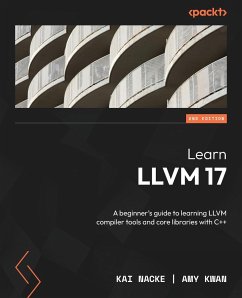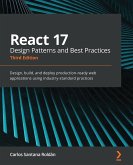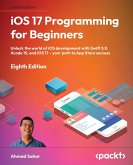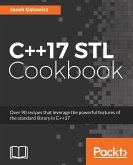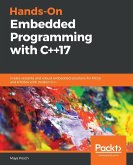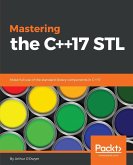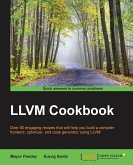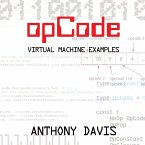Learn how to build and use the complete spectrum of real-world compilers, including the frontend, optimization pipeline, and a new backend by leveraging the power of LLVM core libraries Key Features - Get to grips with using LLVM libraries step by step - Understand the high-level design of LLVM compilers and apply these principles to your own compiler - Add a new backend to target an unsupported CPU architecture - Purchase of the print or Kindle book includes a free PDF eBook Book Description LLVM was built to bridge the gap between the theoretical knowledge found in compiler textbooks and the practical demands of compiler development. With a modular codebase and advanced tools, LLVM empowers developers to build compilers with ease. This book serves as a practical introduction to LLVM, guiding you progressively through complex scenarios and ensuring that you navigate the challenges of building and working with compilers like a pro. The book starts by showing you how to configure, build, and install LLVM libraries, tools, and external projects. You'll then be introduced to LLVM's design, unraveling its applications in each compiler stage: frontend, optimizer, and backend. Using a real programming language subset, you'll build a frontend, generate LLVM IR, optimize it through the pipeline, and generate machine code. Advanced chapters extend your expertise, covering topics such as extending LLVM with a new pass, using LLVM tools for debugging, and enhancing the quality of your code. You'll also focus on just-in-time compilation issues and the current state of JIT-compilation support with LLVM. Finally, you'll develop a new backend for LLVM, gaining insights into target description and how instruction selection works. By the end of this book, you'll have hands-on experience with the LLVM compiler development framework through real-world examples and source code snippets. What you will learn - Configure, compile, and install the LLVM framework - Understand how the LLVM source is organized - Discover what you need to do to use LLVM in your own projects - Explore how a compiler is structured, and implement a tiny compiler - Generate LLVM IR for common source language constructs - Set up an optimization pipeline and tailor it for your own needs - Extend LLVM with transformation passes and clang tooling - Add new machine instructions and a complete backend Who this book is for This book is for compiler developers, enthusiasts, and engineers new to LLVM. C++ software engineers looking to use compiler-based tools for code analysis and improvement, as well as casual users of LLVM libraries who want to gain more knowledge of LLVM essentials will also find this book useful. Intermediate-level experience with C++ programming is necessary to understand the concepts covered in this book. Table of Contents - Installing LLVM - The Structure of a Compiler - Turning the Source File into an Abstract Syntax Tree - Basics of IR Code Generation - IR Generation for High-Level Language Constructs - Advanced IR Generation - Optimizing IR - The TableGen Language - JIT Compilation - Debugging Using LLVM Tools - The Target Description - Instruction Selection - Beyond Instruction Selection
Hinweis: Dieser Artikel kann nur an eine deutsche Lieferadresse ausgeliefert werden.
Hinweis: Dieser Artikel kann nur an eine deutsche Lieferadresse ausgeliefert werden.

